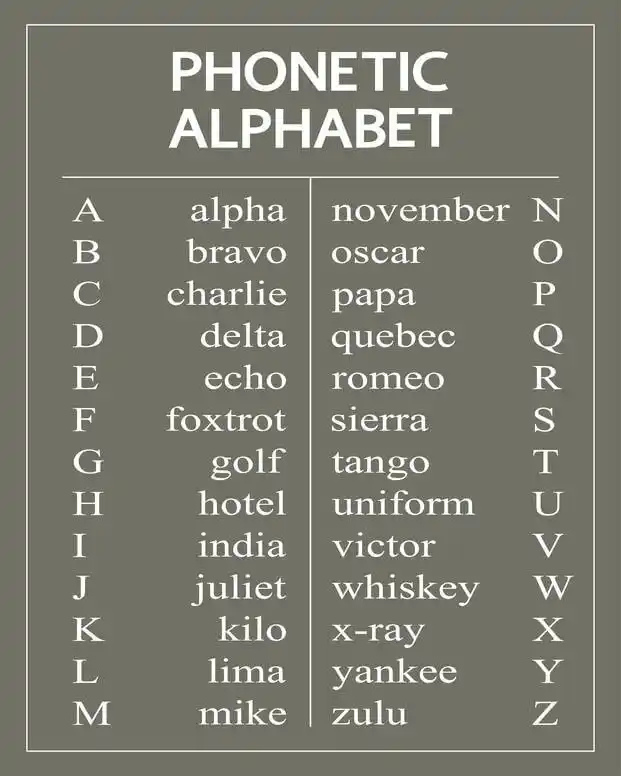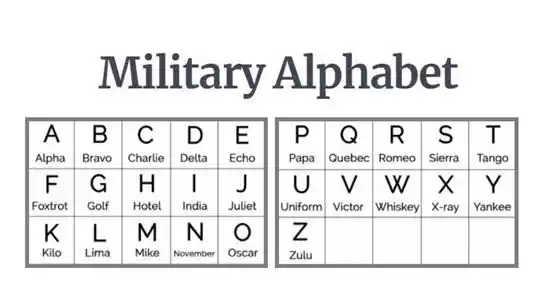Did you know there was a military alphabet? This alphabet is a special phonetic alphabet that the military uses to communicate with radios, other devices, and other devices. The military alphabet was created in order to facilitate communication between military personnel.
What is the military phonetic alphabet called?
The alphabet for military use is a set that spells out letters on radio or telephone. This system ensures clarity and accuracy when communicating even in noisy or noisy surroundings. The phonetic alphabet for military use consists of the traditional English alphabet, as well as a few extra words specifically designed for military usage. These include “Alpha,” Bravo, and “Charlie”.
Each word in the military phonetic alphabet is corresponding to a letter of the normal English alphabet. To ensure that everyone is using the same pronunciation guideline All military personnel are taught this phonetic alphabet upon entering service.
Because of this, this military alphabet is so meaningful for every member of the military who has served and will serve. You can spell their names or your blessings with military alphabet initials, and make them a lapel pin to give to your military friends or family. This is a great unique and interesting gift for the military, police, law enforcement, pilots, or military enthusiasts. Customize now on custompins.ca

History of the military alphabet
The alphabet for military use is also called the International Radiotelephony Spelling Alphabet (IRSA). It was created by the International Civil Aviation Organization (ICAO).
The IRSA is used to spell out words and letters via radio. This helps avoid confusion between words that have similar sounds. The first official version of the military alphabet was approved in 1927, although a version was used as early as 1913. The current version, also known as the NATO alphabet and used by the nations of NATO was approved in the year 1957.
The military alphabet was used during World War II
In World War II, the United States military used a modified version of the Joint Army/Navy Phonetic Alphabet (JANAP). The alphabet was adopted in 1941, and in use until 1957, which was the year it was officially discontinued by the IRSA. Today the only parts of the JANAP WWII-era alphabet still in use include “Charlie,” “Mike,” “Victor” and “X-Ray.”
| Letter | 1957-Present | Morse Code | 1913 | 1927 | 1938 | World War II |
| A | Alfa (or Alpha) | . _ | Able | Affirmative | Affirm | Affirm (Able) |
| B | Bravo | _ . . . | Boy | Baker | Baker | Baker |
| C | Charlie | _ . _ . | Cast | Cast | Cast | Charlie |
| D | Delta | _ . . | Dog | Dog | Dog | Dog |
| E | Echo | . | Easy | Easy | Easy | Easy |
| F | Foxtrot | . . _ . | Fox | Fox | Fox | Fox |
| G | Golf | _ _ . | George | George | George | George |
| H | Hotel | . . . . | Have | Hypo | Hypo | How |
| I | India | . . | Item | Interrogatory | Int | Int (Item) |
| J | Juliett | . _ _ _ | Jig | Jig | Jig | Jig |
| K | Kilo | _ . _ | King | King | King | King |
| L | Lima | . _ . . | Love | Love | Love | Love |
| M | Mike | _ _ | Mike | Mike | Mike | Mike |
| N | November | _ . | Nan | Negative | Negat | Negat (Nan) |
| O | Oscar | _ _ _ | Oboe | Option | Option | Option (Oboe) |
| P | Papa | . _ _ . | Pup | Preparatory | Prep | Prep (Peter) |
| Q | Quebec | _ _ . _ | Quack | Quack | Queen | Queen |
| R | Romeo | . _ . | Rush | Roger | Roger | Roger |
| S | Sierra | . . . | Sail | Sail | Sail | Sugar |
| T | Tango | _ | Tare | Tare | Tare | Tare |
| U | Uniform | . . _ | Unit | Unit | Unit | Uncle |
| V | Victor | . . . _ | Vice | Vice | Victor | Victor |
| W | Whiskey | . _ _ | Watch | William | William | William |
| X | X-ray | _ . . _ | X-ray | X-ray | X-ray | X-ray |
| Y | Yankee | _ . _ _ | Yoke | Yoke | Yoke | Yoke |
| Z | Zulu | _ _ . . | Zed | Zed | Zed | Zebra |







